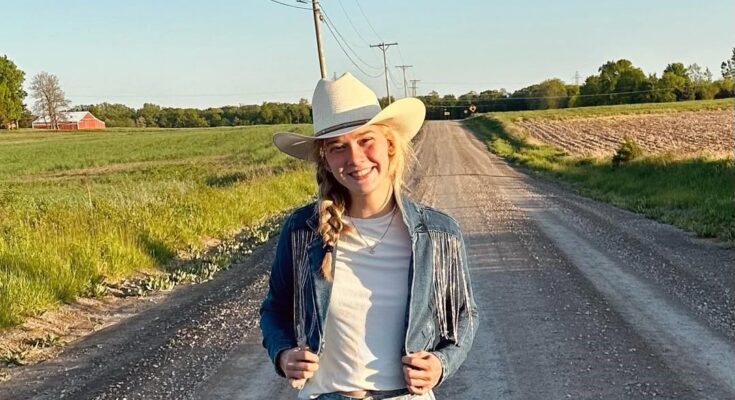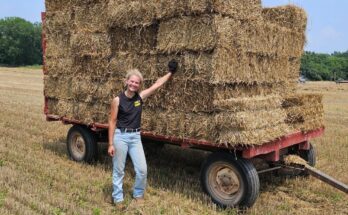In a dusty town where the wind whispered secrets and the sunsets painted the horizon in strokes of fire and honey, there she stood—Denim and Rhinestone Baby. Nobody really knew where she came from, but everyone had a theory. Some said she rode in on a Harley that growled louder than the desert coyotes. Others claimed she’d just always been there, like the rust on the old water tower or the jukebox in Mickey’s Diner that still played Patsy Cline on loop.
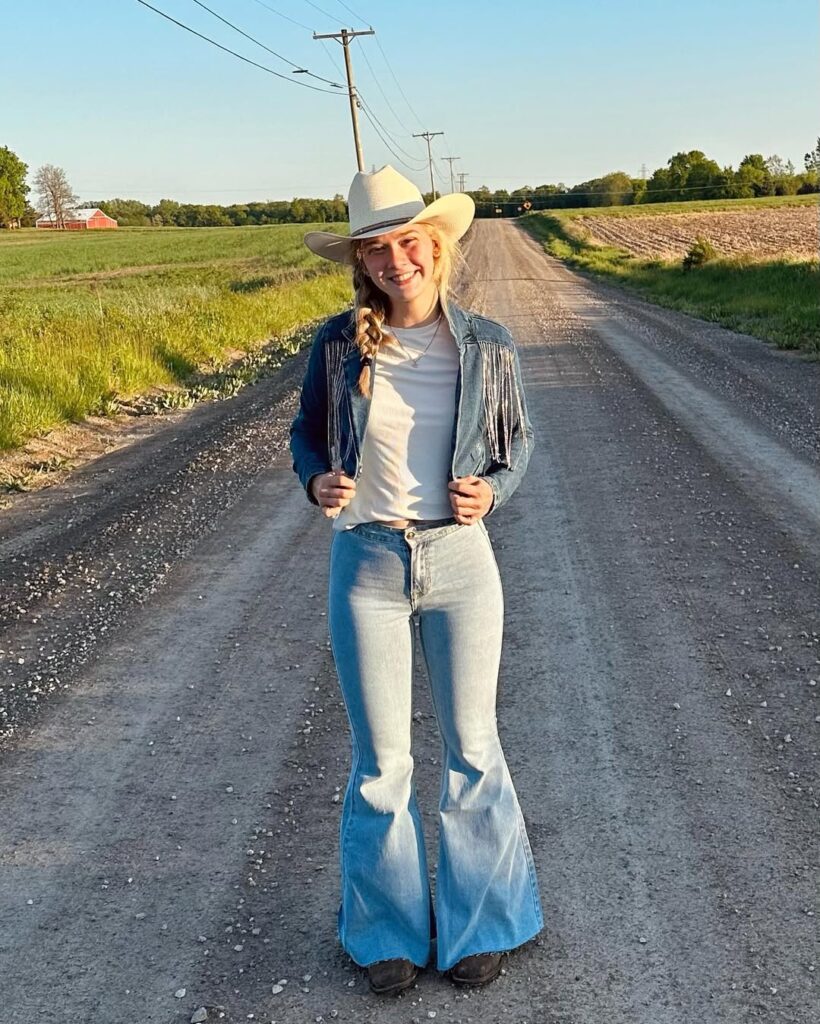
She was the kind of girl who turned heads not because she tried to, but because she didn’t. Long legs in tight-fitted jeans that carried the stories of dirt roads and wild nights. A jean jacket bedazzled with rhinestones that caught the light just right, scattering stardust over the broken pavement. Hair the color of midnight oil and a laugh like a Sunday morning gospel choir. Denim and Rhinestone Baby was a walking contradiction: tough as barbed wire, soft as the first kiss of summer rain.
She lived in a trailer parked behind the gas station, where she worked part-time fixing flat tires and telling fortunes with a deck of worn playing cards. Folks said she could read your soul in the crease of a palm or the way you sipped your sweet tea. People came from three counties over to hear her say, “You got love on the horizon,” or “Be careful near water, sugar.” Whether she was psychic or just knew how to read people, no one really cared. She made them believe in something, and that was enough.
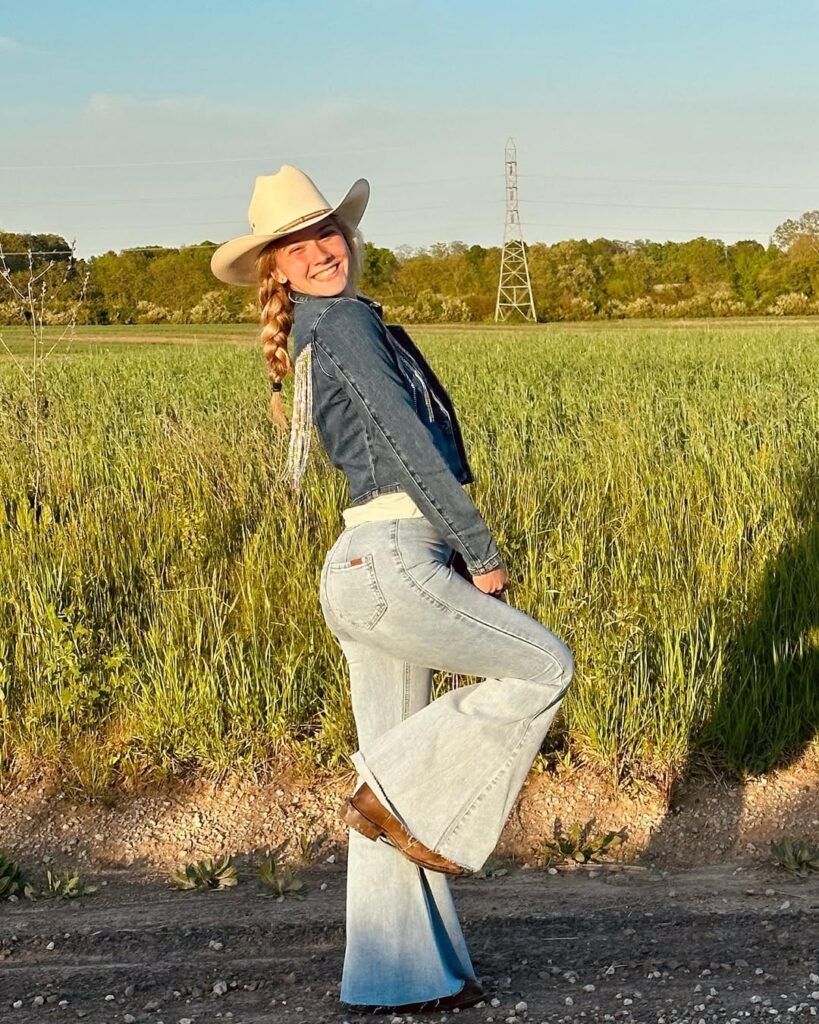
Every Saturday night, the town’s only bar—The Silver Spur—turned into a dance hall lit with neon dreams. That’s where she came alive. Wearing red boots and lips to match, she’d saunter in like she owned the place, a rhinestone queen amid a sea of flannel and whiskey breath. The jukebox always played her favorite—”Jolene”—right when she walked through the door, though no one ever claimed to have queued it up.
People watched her with a mix of awe and envy, especially the girls who grew up being told to sit still and be nice. Denim and Rhinestone Baby didn’t sit still, and she sure as hell wasn’t always nice. She danced like she was shaking off ghosts, like the music was pumping straight from her heart into the soles of her feet. The boys fell in love with her in pieces, like trying to catch stardust in a mason jar. And the girls? Well, more than a few realized they didn’t want to be her—they wanted her.
But Baby—people called her that, half affection, half reverence—didn’t belong to anyone. She made it clear with a smile that could disarm a deputy and a stare that could start a bar fight. “You can buy me a drink,” she’d say, “but you can’t buy me.” She was freedom in denim, rebellion in rhinestones.
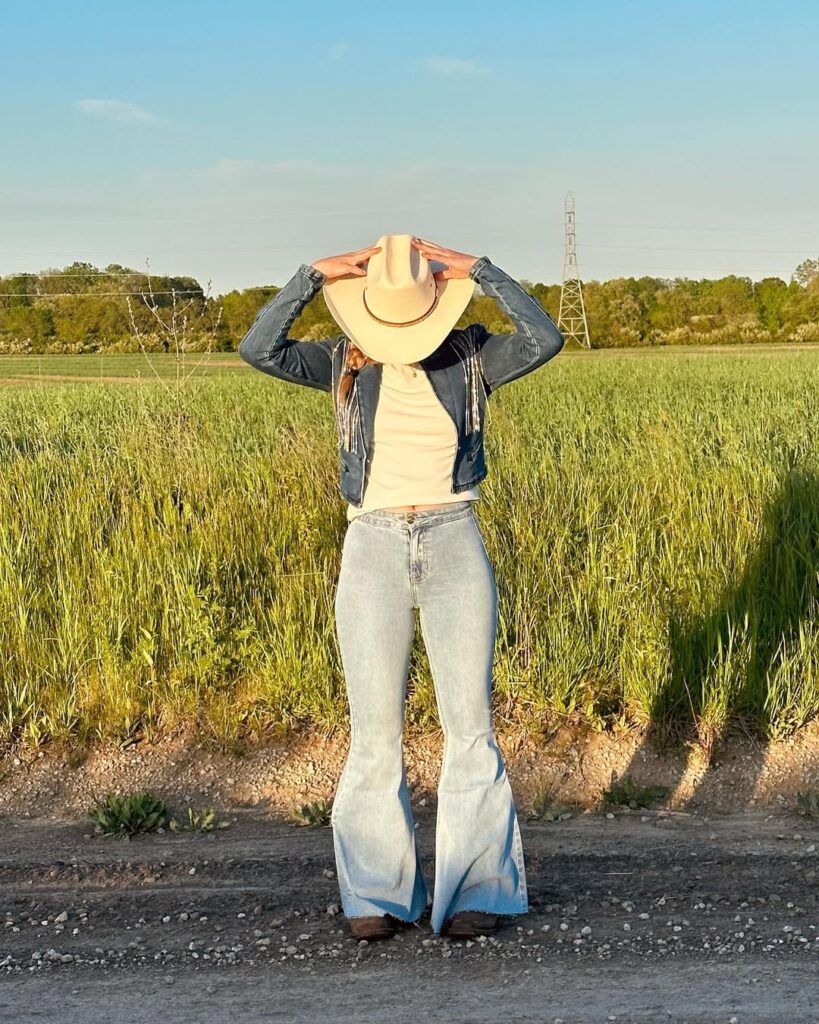
Some nights, if you caught her just right, when the crowd thinned and the band played something slow and sad, she’d sit alone by the bar and look out the window like she was watching a memory unfold. People said she had a heartbreak in her past that she carried like a loaded gun—never drawn, but always there. Maybe it was a boy from back East who promised her the stars and left her in the dark. Maybe it was a girl in a big city who loved her in secret and left her in shame. Nobody knew. Baby never said, and no one dared ask.
What they did know was that she wasn’t running from something—she was running toward something. A dream, maybe. Or peace. Or just a place where she could be her wild, glittering self without anyone trying to cage her.
Children adored her, maybe because she spoke to them like little adults or maybe because she had a way of making even the most ordinary things magical. She once told a kid the freckles on his nose were constellations and that he was a walking galaxy. The kid beamed for a week.
Old folks liked her too. She reminded them of a time when the world felt more alive, less filtered. She listened to their stories, laughed at their jokes, and danced with them when no one else would.
But not everyone loved her. Some of the more “God-fearing” types whispered that she was a bad influence, that she encouraged rebellion, desire, questions. Maybe they were right. Maybe she was a spark in a town that preferred the dark. But that spark lit fires in people—fires of self-worth, of courage, of longing for more than the cards they’d been dealt.
And then, just as mysteriously as she arrived, she was gone.
One morning, the trailer was empty. No note, no goodbye. Just the echo of Patsy Cline from the jukebox and a pair of red boots sitting on the front steps. Some say she left to chase her dreams. Others think she got tired of saving a town that didn’t know how to be saved. A few believe she never really existed, that she was a figment of collective imagination, a symbol more than a person.
But those who danced with her, who laughed with her, who cried while she read their fortune—they know better.
They remember her eyes, full of stars and secrets. Her voice, equal parts velvet and grit. Her presence, like lightning in a bottle. They remember how she made them feel: seen, alive, enough.
Denim and Rhinestone Baby may have been a passing storm, but her thunder still echoes through the canyon of memory. And every now and then, when the wind kicks up the dust just right, you can hear her laugh carried through the sagebrush, wild and free.
Because some spirits aren’t meant to stay. They’re meant to stir. To shimmer. To shine.
